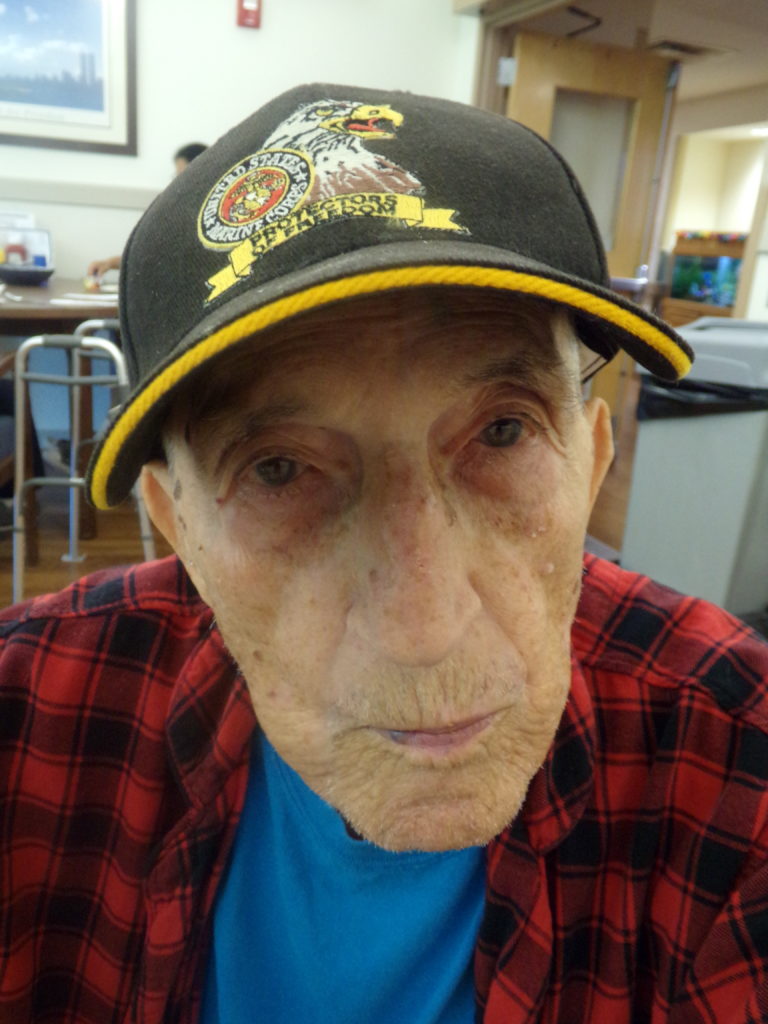
By Brandon Fey
South Philly Review
Joseph DeMarco – a resident of the Delaware Valley Veterans Home, 2701 Southampton Road in the Far Northeast – is a World War II veteran who continues to embody the pugnacious spirit of a Marine. He was born and raised in South Philadelphia, a place he still refers to as “the best place around.” At the news of the Japanese ambush of the American naval base at Pearl Harbor in December 1941, DeMarco was compelled by a sense of duty to join the defense of his country.
At the age of 17, he sought enlistment in the U.S. Marine Corps. Out of a group of six other young men with whom he applied, DeMarco was the only one accepted. His age required the signatures of both his parents, which he was easily able to provide through a convincing forgery. Once enlisted, DeMarco was sent to Marine Base Camp Lejeune for basic training.
Prior to his enlistment, DeMarco had toughened himself from an early age, frequently engaging in street fights in his youth. He was made to box while in the Marines in training due to his skill in using his fists. While this kind of upbringing may have made DeMarco fit for service, his parents thought differently and had him removed from the Marines in the midst of his training.
Six months later at the age of 18, DeMarco immediately reenlisted and underwent basic training again at Camp Lejeune. His first assignment as a full-fledged Marine was to board a ship departing from California that was to take him to Guadalcanal in the British Solomon Islands, where he was to support the ongoing campaign to remove Japanese forces from the island. However, midway through the voyage, his ship was suddenly redirected to the Panama Canal.
During the Second World War, the Panama Canal quickly proved the magnitude of its importance as a vital linkage between the East and West coasts of the U.S. for the transfer of supplies and naval vessels. Naturally, the canal was a strategic target for German and Japanese military intelligence. American command identified the gravity of this threat and tasked DeMarco’s unit with the defense of the passage.
In this lesser-known theater of the war, DeMarco stood on guard against Axis saboteurs. He recalls a close encounter he had with a sudden ambush one night while on watch duty. Shortly after he had rotated stations, the Marine who had taken his previous post was suddenly killed by a band of Japanese soldiers hiding in the tall weeds.
“If I was still there, I would have been killed,” DeMarco said.
The remaining guards quickly responded, neutralizing the threat.
After spending about two years in Panama, DeMarco was sent to Texas. He remained there for a brief period before boarding another ship meant for Guadalcanal, which interestingly befell a similar change in plans.
DeMarco explained, “We boarded a ship and were going to go to Guadalcanal, but the ship turned around one night and we were wondering why. As it turned out, they brought us back to the Panama Canal.”
Recent intelligence had suggested that combined German and Japanese forces were plotting to bomb the canal, hence the need for the Marines to return to the crucial isthmus. After about a year on guard without an attack, DeMarco was eventually sent to Washington, D.C. toward the war’s end to participate in a senator’s funeral.
Following his service, DeMarco returned to South Philadelphia where he worked as a presser in a tailor shop. During this time, he enjoyed trips to Atlantic City and weekly dances with friends at a local dance club. It was at one of these dances where DeMarco met his wife, with whom he raised two daughters and a son. During this time he also worked night shifts as a waiter and sold beer at Phillies games. His family endured several hardships in these later years with the early passing of his son and daughter.
Throughout his life, DeMarco has always enjoyed games of chance. At the age of 9 years old, he began shooting dice: a game he would later learn was frowned upon by his superiors in the Marine Corps. He remembers one occasion when his sergeant caught him with a set of dice and made him clean the entire barracks with a toothbrush as punishment. Thinking he could mitigate his loathsome fate, DeMarco decided to improvise.
“I got a rag and I started doing it with the rag. I had forgotten that his [the sergeant] office was straight down the hall until I heard him say, ‘DeMarco, start again,’ ” he recalled with a grin. “He then came over about an hour later and told me to get back in bed.”
DeMarco continues to enjoy playing cards and taking trips to casinos. He remains firm in his resolution to continue, saying, “There is no way I am going to stop.”
Joseph DeMarco will reach 100 years of age on Aug. 7. As he soon approaches this major milestone, he continues to speak the same fiery spirit he has embodied throughout his entire life: growing up on the streets of South Philadelphia, through two sets of training in the U.S. Marine Corps, serving his country in the jungles of Panama and as a husband and father working to support his family. DeMarco is a man of distinct character whose unfailing courage and vitality in the face of challenges is an inspiration to those around him. ••
